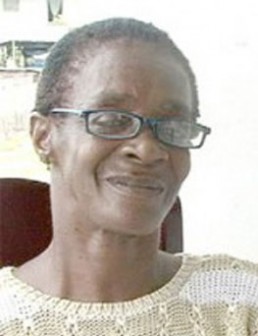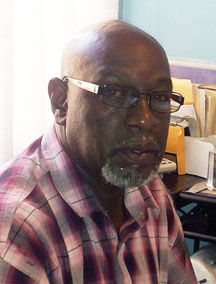—Coordinator
In 1975 Aubrey left his homeland as a bright Guyana scholar and after he graduated with a degree in Business Economics and Informa-tion Systems from the University of San Francisco he easily found employment. His addiction to crack cocaine, however, saw him fall from working on Wall Street to living on the streets of Linden and eating from rubbish bins.
But in February 2010 he was thrown a lifeline. He immediately grabbed hold of it and has no intention letting go. That lifeline was the Phoenix Recovery Project which has been 55-year-old Aubrey’s home since 2010, because even though he has completed the nine-months programme he has remained volunteering his services and continues to benefit from the rehabilitative environment.

Phoenix has been a lifeline to many persons addicted to substance abuse since it opened its doors in 2000, and in 2007 it created history when it became the first institution (and still the only one) which offers a resident rehabilitative programme to females.
But all of this could end as coordinator of the project Clarence Young said that the institution located at Mon Repos, East Coast Demerara, is now in dire financial straits and that should the project not receive some financial funding they may be forced to close their doors.
“We need support from the government; we are in dire straits; we need support from the government and the corporate world,” Young told the Sunday Stabroek in an interview.
Asked if the project did not receive the needed funding what would happen, Young replied: “I don’t know how we would be able to sustain the programme, it is a monthly challenge… just to keep it going…”
He said that apart from monthly donations of food supplies from three corporate citizens they do not receive any funding. From time to time the government through the Ministry of Human Services & Social Security and the Ministry of Health would sponsor someone to be part of the programme.
When the women’s programme started in 2007 it was with a grant from the US State Department which ended in 2009.
“It is really frustrating, because when you help you don’t help an individual; as such you help a family, a community and by extension you help relations,” said Young.
He said over the years they have worked with persons digging ditches to members of the clergy, members of the legal profession, doctors, engineers and many other people all of whom, “we have been able to assist to get their lives back together.
“I think for me one of the greatest rewards is probably [to] see a parent or child smiling because they have gotten their loved one back; that is invaluable. And because drugs respect no barriers a lot of these people are integral assets to their homes… communities,” an impassioned Young said.
One of the women who has benefited from the programme is Sandra Braithwaite, who was presented emaciated and dishevelled to the recovery project on September 9, 2008 which brought to an end her 17 years on the street. She spent ten months at the project and now she lives alone and swears that she hasn’t touched cocaine, alcohol or tobacco since. And she also continues to volunteer her time at the institution helping other women.
Sandra is one of the 60 women who have checked into the rehab centre since it opened its doors to women.
Five hundred
Young said from its inception the rehab centre has worked with about 500 people, and while it costs $60,000 per month to house one resident, he said this barely covers food in addition to which they have to provide accommodation and give therapy to the individual. But he did admit that by Guyana’s standard it is still a lot of money and as such the project, “really needs some kind of help to continue to reach out to these people.”
They have thirteen staff members working at the institution and he said there are quite a few persons who are in the process of recovery who volunteer their services and are paid a small stipend. But the volunteers sometimes prevent new persons from getting an opportunity to benefit from the programme as they need to be accommodated. Young said that the institution has worked with persons from all ten administrative regions as well as some from Cayenne, Brazil, Suriname and Trinidad.
The success of the programme is there for all to see Young said, noting that it was the government who gave them a national award last year for its contributions.

Many times, he continued, they have been forced to turn away persons, not only because they could not pay but also because the project did not have the capacity to accommodate them. In every group there are one or two persons who cannot pay and they would try to accommodate these while there are a few persons who would sponsor some who are without the capacity to pay.
“It’s kind of heart-wrenching [to turn away someone] because you never know when it is the time for someone…” he said.
And he said those who abuse crack cocaine seemed to be the “forgotten population” and there is a big problem with infectious diseases as well as chronic diseases within the drug-using population.
To make matters more complicated, Young noted that because substance abuse disorders are now classified as mental illnesses, they now have quite a few clients with whom they have to work in collaboration with psychiatric units and they have to get these persons to the clinic.
They rent the building at Mon Repos and Young said recently a company offered them land in Ituni and it would be wonderful if they could be relocated to that area, as with sufficient land they could work on self sufficiency, but he knows it is a tall order to accomplish with them barely receiving enough funding just to keep their doors open.
‘Second chance’
Aubrey credits the recovery project as having given him a second chance on life. He describes himself as one of the “fortunate ones” since money was not available to pay for his treatment but management offered him a place.
Volunteering his service at the institution Aubrey also works with the One Lap Top Per Family (OLPF) project from the Mon Reps office, as Phoenix serves as a hub office for the project. He is one of those who continues to live at the recovery centre even though he has completed his programme. Now Aubrey says he has been able to establish meaningful relationships with his six children, five of whom are in the United States.
His drug abuse also led him to develop mental problems and he had spent some three months at the National Psychiatric Hospital in Canje, Berbice.
Reflecting on how he became hooked Aubrey recalled it was while he was employed with AT&T, an American multinational telecommunications corporation, as an information engineer that he was introduced to cocaine socially in 1982.
According to him it is an “acceptable norm to socialize with drugs” but he became hooked.
“It became a problem for me and my employment and I swiftly migrated to New York; I thought a geographical relocation would have solved my problem,” he said.
He was joined in New York by his wife and children and Aubrey said he remained clean for four years building a life for his family while working with the Bank of Switzerland in the World Trade Center as a computer analyst.
But he became hooked again and he relocated to Florida without his family, and never regained employment in the US. In 1991 he was charged with being in possession of a smoking utensil and after serving a one year sentence he was deported.
On his return he received the support of his relatives and friends. He “activated his scholarship contract” by walking into the Linmine bauxite office and stating he was ready to take up his contractual arrangement. He was recruited and placed as a senior information systems manager at Linmine but again he fell prey to crack cocaine in 1998 while employed. He hid his addiction while working until 2005 when he was laid off with a redundancy package, most of which he “smoked out” and he subsequently “ended up living in the streets in Linden. My mom passed away and my loved ones distanced themselves from me…
“My life went into the dumps, I slept on cardboards and ate out of garbage cans,” he said.
And like Aubrey 45-year-old Deonarine Jaisingh is also grateful to the rehab centre. He was also sent back to Guyana from the US where he had migrated at age 12 and according to him he was introduced to drugs from the time he arrived in the US.
“First night I landed my cousin gave me marijuana to smoke,” he recalled, but he was enrolled in school and later gained employment even as he continued to use drugs.
At first it was a “fun thing” but it later became a need and he had to find ways to sustain his addiction. He was returned to Guyana following an incident in a night club after which he was charged and sentenced.
In Guyana he struck up a relationship and got two children, but because of his addiction he soon lost his wife and children since he had “reached rock bottom.”
“I lived on the streets for six months; it was one of the most dreadful things, people started to mistreat me, embarrass me. My wife hid whenever she saw me and stopped my children from seeing me,” Jaisingh recalled.
He has been clean since July of this year and while this is not his first attempt to rid himself of the addiction Jaisingh hopes that this will be his last, and said he has already been granted contact with his children which has really helped him to stay clean.
“I am trying to put things in place; I have a plan. This programme is a godsend programme; only one in Guyana that enables sick and suffering addicts to enhance their lives. I have not regretted that I enter the programme,” Jaisingh said.
Phoenix Recovery also works with the Ministry of Home Affairs offering counselling to inmates and patients, the Ministry of Health, facilitating the training of structural relapse prevention (SRP) and the provision of edutainment services for schools, among other things. It also does court mandated treatment, provides an annual session of lectures on substance abuse disorders in the Department of Social Sciences, University of Guyana, and assists students with school-based assessments. It is also involved in street-based intervention programmes and has a family programme with interventions geared at re-integration into the family and counselling for the trauma experienced as a result of addictions.
The centre can be contacted on 220-6825 or 623-1437 or at email [email protected]




